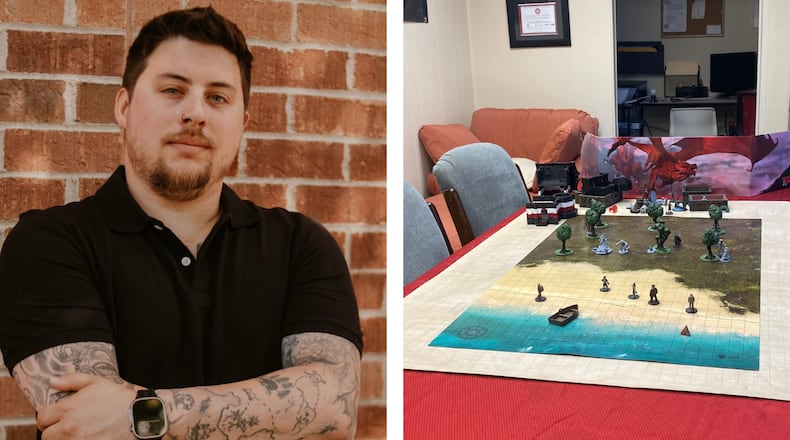Dragons Den Counseling, Webber’s private practice that opened in Kettering in May, is dedicated to helping neurodivergent individuals and families navigate life’s obstacles through the power of imagination.
But rather than simply addressing deficits or challenges, Dragons Den Counseling connects with clients on their own turf, leveraging games, movies, TV shows and the like to implement treatment for groups and individuals. By combining a client’s interests and aspects of their personal experience, the counselor provides a starting point for contextualization and understanding within a safe, familiar space.
One aspect of this therapy, blanketed as Geek Therapy, focuses on the use of tabletop role-playing games like Dungeons & Dragons. By creating characters and considering the arbitrary rolls of the dice, a game like D&D — while seemingly just that, a game — has the power to shift aspects of reality with lessons learned through fantasy.
Webber’s eclectic approach also implements techniques from Cognitive Behavioral Therapy and Solution-Focused Brief Therapy.
It’s an epic quest for self-discovery and growth, inspired by the world of nerd culture.
Inside Dragons Den, the walls are adorned with D&D maps and other relics. A book shelf holds fifth edition D&D manuals in hardback. And somewhere, surely, is a trove of polyhedral dice.
As the office’s centerpiece, a tiled map of beachfront terrain sits on top of a table, the one where sessions take place. A flurry of miniature figurines flank the waters and face off against what are evidently enemies further up the shore. At the table’s end is the Dungeon Master’s screen, shielding adventure information for the DM’s eyes only.
The setup is part of a campaign, or a recurring adventure. In this case, the beachfront scenario takes place within the world and timeline of the group sessions, which typically last six weeks.
In the first session, called “session zero,” the participants/clients create characters to immerse into fantastical worlds. It’s also an opportunity for Webber and the client to discuss what real-life hurdles they’d like to explore through the game.
While race, class, gender, sexuality and other options for the characters are seemingly endless (one player is currently a cat), Webber says clients will often make characters that represent them in some way, bridging the gap between game and therapy.
“Their values will bleed into their character; it’s subconscious, even when playing for fun,” Webber said. “They take some of those issues or trauma they have had in the past and incorporate that into their character. That will then influence how their character behaves in certain scenarios. And I can put them in situations where they can work towards overcoming those issues.”
Dragons Den group sessions are for ages 11 to 17, as well as for adult groups ages 18 and up. Webber has worked with clients in their thirties, and has also considered taking Geek Therapy into retirement homes. He mainly works with neurodivergent adolescents, often with autism or ADHD. Webber himself has ADHD, which is what initially attracted him to the mental health profession.
The sessions at Dragons Den run around two hours with consistent check-ins during gameplay. The last 30 minutes are set aside for reflecting on the events of the game. They identify skills used in session and discuss how to implement them into real situations.
But what is it about tabletop games that acts as a catalyst for improving social skills, impulse control and communication?
“If you have to directly address the problem, it can be difficult and scary,” Webber said. “But with narrative approaches, it can be about somebody else experiencing that exact same problem as you. It separates that so it makes it easier to talk about. And my viewpoint is that a lot of people have the solutions, but they might not know what they know.”
The Therapeutic Game Master, Webber, is an adjudicator, a referee. Where the narrative goes depends on what the players want to explore. But it’s the GM, paired with the roll of the dice, who decides whether or not the actions are successful. The dice can sometimes wreak havoc; Webber says that’s a part of the learning process.
“If the dice don’t work in their favor, it’s just another therapeutic tool,” he said. “We take a moment, pause, think. Okay, it didn’t work out, but I accept that. Life goes on.”
As characters level up, as they move through sessions, they can take advantage of their strengths, making the dice less effective on the game — and the therapeutic process.
So it doesn’t really matter whether Webber’s clients play as elves, wizards or barbarians because by the end of it, they’re playing as themselves.
“It’s almost like tricking them into learning social skills, because they’re playing a game,” Webber said. “But at the same time they’re actually practicing real world skills.”
Contact this contributing writer at branberry100@gmail.com.
More info
Website: dragonsdencounseling.com
Email: info@dragonsdencounseling.com
Address: 28 E. Rahn Road, Ste. 217, Kettering
About the Author


